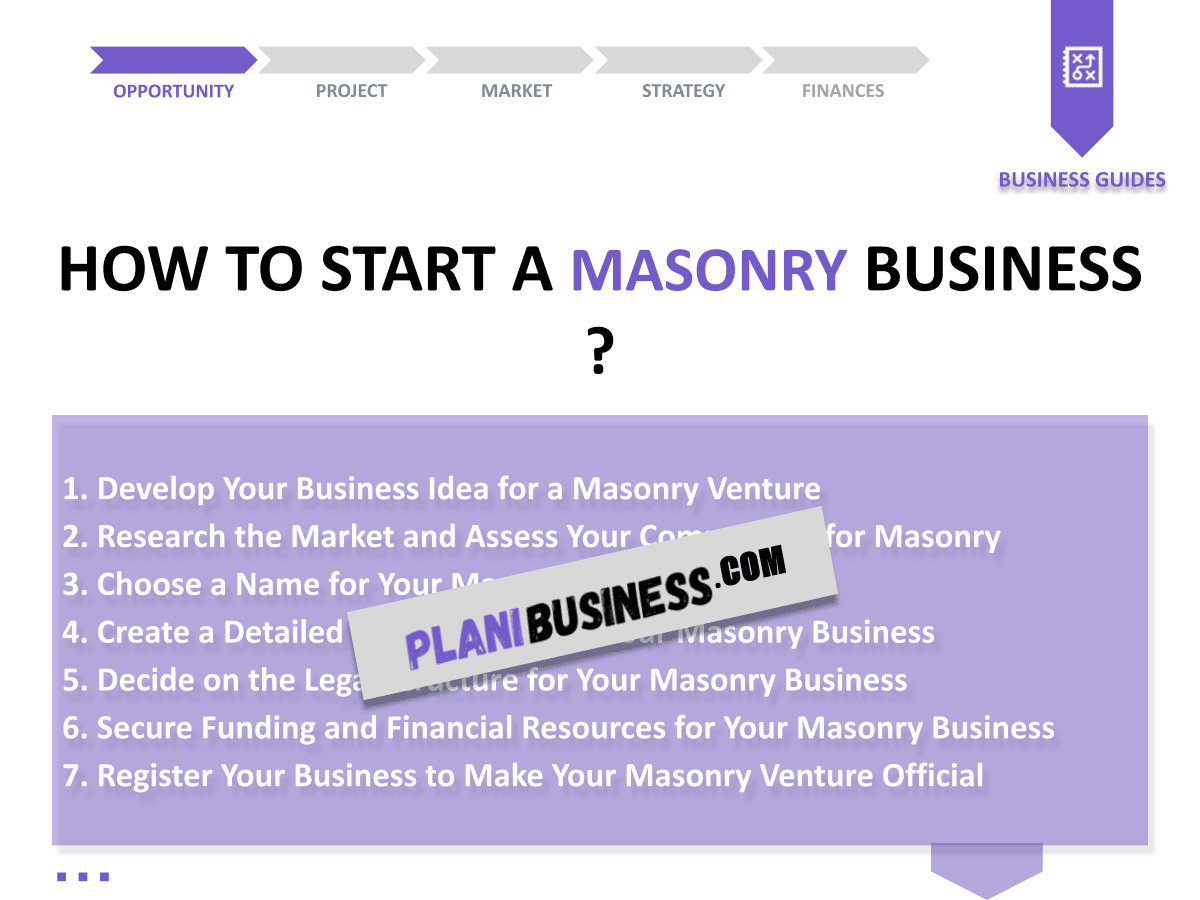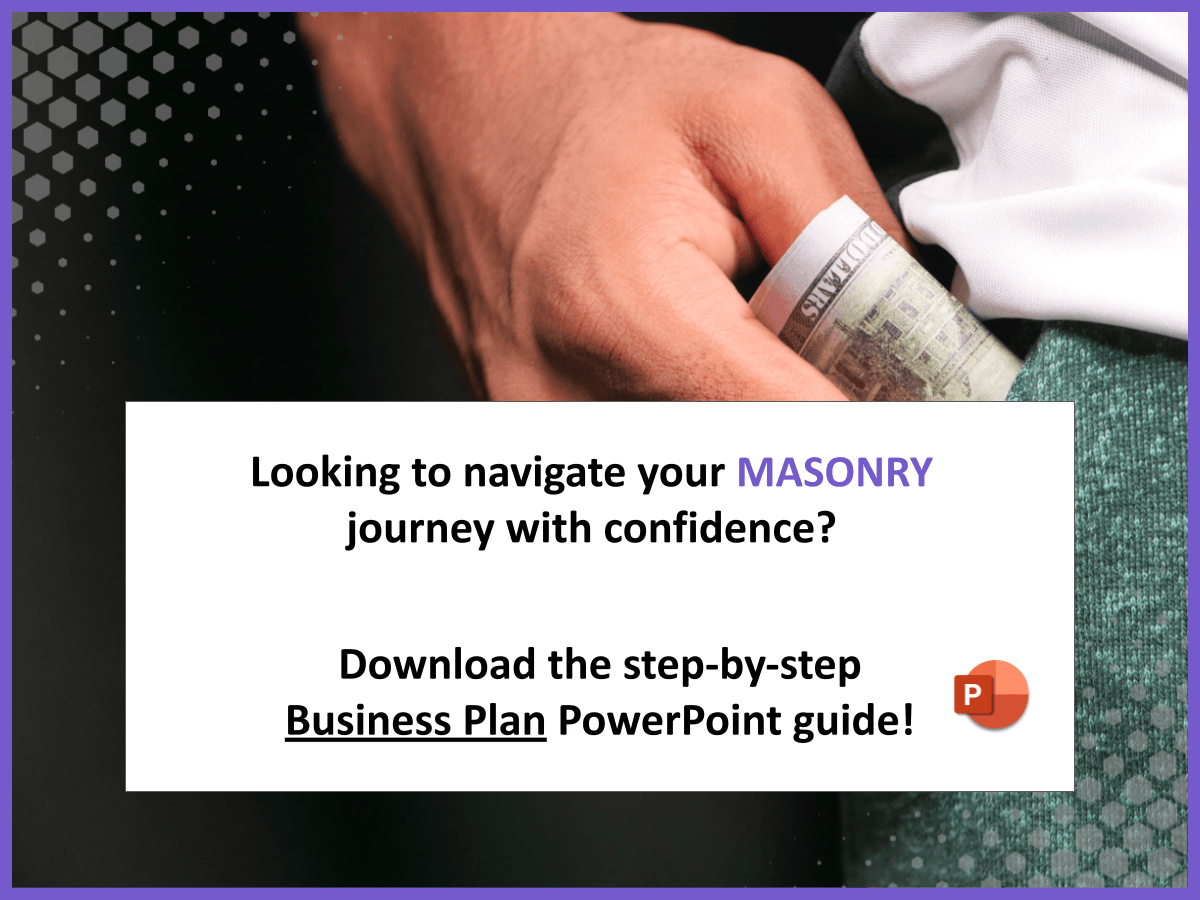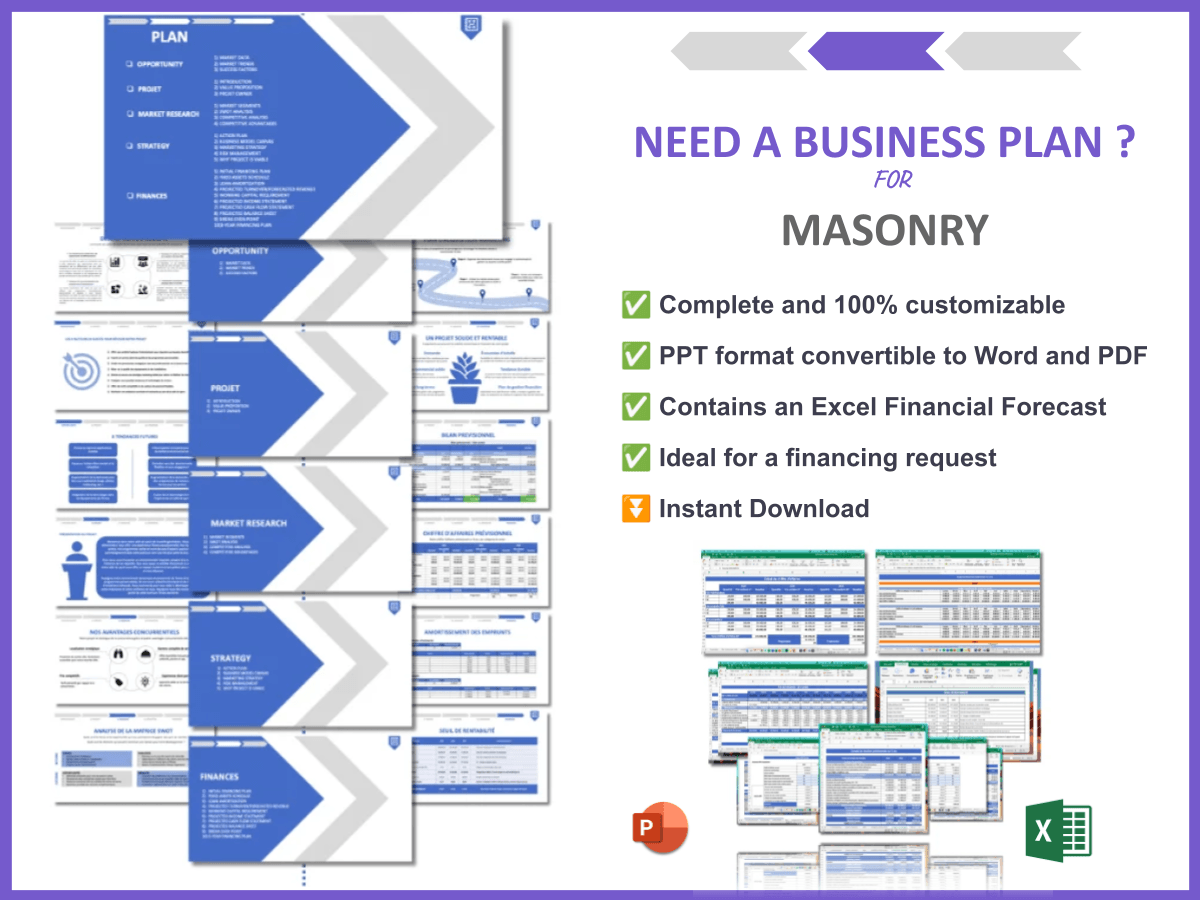Are you thinking about starting a masonry business? You’re not alone! Many aspiring entrepreneurs are drawn to the world of masonry due to its potential for creativity and profit. Did you know that the construction industry is projected to grow by over 5% in the coming years? This growth presents an excellent opportunity for you to dive in and make your mark. In this guide, we’ll explore how to start a masonry business from the ground up, providing you with the essential steps to ensure your success.
How to Start a Masonry business involves a series of crucial steps that can help you build a solid foundation. Here’s what we’ll cover:
- Developing your unique business idea
- Researching the market and assessing your competitors
- Choosing a memorable business name
- Creating a detailed business plan
- Deciding on the legal structure of your business
- Securing funding and financial resources
1. Develop Your Business Idea for a Masonry Venture
Starting with a solid idea is crucial. Think about what type of masonry services you want to offer, whether it’s bricklaying, stone masonry, or concrete work. It’s essential to identify your niche in the market. Here are some steps to refine your business idea:
- Assess Your Skills: Consider your strengths and what you enjoy doing. If you love working with your hands and have a knack for detail, masonry could be a perfect fit.
- Identify Market Demand: Research your local area to see which services are most in demand. This can involve talking to potential clients or checking online forums.
- Explore Unique Offerings: Think about ways to differentiate your business. Perhaps you can specialize in eco-friendly materials or focus on artistic stonework.
By honing in on your unique offerings, you can carve out a niche that attracts clients and sets you apart from the competition.
2. Research the Market and Assess Your Competitors for Masonry
Understanding the market landscape is key to your success. Conducting thorough research will help you identify opportunities and challenges in the industry. Here’s how to effectively assess your competition:
- Identify Local Competitors: Look for other masonry businesses in your area. Take note of their services, pricing, and customer reviews.
- Analyze Their Strengths and Weaknesses: Make a list of what your competitors do well and where they fall short. This can give you insights into how to position your business.
- Study Market Trends: Stay updated on industry trends, such as new materials or techniques that could impact your business. Resources like trade publications and online forums can be valuable.
| Competitor | Services Offered | Pricing | Strengths | Weaknesses |
|---|---|---|---|---|
| ABC Masonry | Bricklaying, Stonework | $$$ | Established reputation | Higher prices |
| XYZ Construction | Concrete, Retaining Walls | $$ | Competitive pricing | Lack of variety in services |
By thoroughly researching your competitors, you can better understand how to position your masonry business for success. This knowledge will enable you to create effective marketing strategies and identify gaps in the market that you can fill.
3. Choose a Name for Your Masonry Business
Your business name is your first impression. It should reflect the services you provide and be memorable. Here are some steps to help you choose the perfect name:
- Keep It Short and Simple: A concise name is easier to remember. Avoid complicated spellings or lengthy phrases.
- Make It Relevant: Your name should hint at the services you offer. Consider incorporating words like “masonry,” “construction,” or “brick” to make it clear.
- Check Availability: Once you have a few ideas, check if the business name is available in your area. This includes checking domain names for your website.
For example, names like “Precision Masonry” or “Brick & Stone Creations” can convey professionalism while being easy to recall.
4. Create a Detailed Business Plan for Your Masonry Business
A strong business plan is your roadmap to success. It outlines your goals, strategies, and financial projections. Here’s how to create a detailed business plan:
- Executive Summary: Briefly describe your business concept, mission, and vision. This section provides a snapshot of your masonry venture.
- Market Analysis: Include your research on the industry, target market, and competition. This helps you understand where you fit in the market.
- Services Offered: Clearly outline the services you will provide, such as bricklaying, stone masonry, and concrete work.
- Marketing Strategy: Describe how you plan to attract and retain customers. This could include online advertising, networking, and local promotions.
- Financial Projections: Include a budget, projected income, and expenses. This will help you gauge the financial feasibility of your business.
I recommend checking out this business plan template for Masonry. It’s super detailed and can save you a ton of time! This template can guide you through the process and ensure you cover all necessary aspects.
| Section | Description |
|---|---|
| Executive Summary | Overview of business concept and goals |
| Market Analysis | Insights into industry and competition |
| Services Offered | List of masonry services provided |
| Marketing Strategy | Plans for customer acquisition and retention |
| Financial Projections | Estimated income, expenses, and budget |
By creating a detailed business plan, you’ll not only have a clear direction but also increase your chances of securing funding and support for your masonry business.
5. Decide on the Legal Structure for Your Masonry Business
Choosing the right legal structure is vital for your operations. The structure you select will affect your taxes, liability, and business registration requirements. Here are some common options to consider:
- Sole Proprietorship: This is the simplest structure, where you are the sole owner. It’s easy to set up but comes with unlimited personal liability.
- Limited Liability Company (LLC): An LLC provides liability protection, separating your personal assets from your business. It’s a popular choice for many small businesses.
- Corporation: A corporation is a more complex structure that offers the most protection from personal liability. However, it involves more regulations and tax requirements.
Consider consulting with a legal expert to discuss the pros and cons of each structure. This can help you make an informed decision that aligns with your goals and the nature of your masonry business.
| Legal Structure | Pros | Cons |
|---|---|---|
| Sole Proprietorship | Easy to set up, complete control | Unlimited personal liability |
| Limited Liability Company (LLC) | Liability protection, tax flexibility | More paperwork than sole proprietorship |
| Corporation | Limited liability, easier to raise capital | Complex structure, more regulations |
6. Secure Funding and Financial Resources for Your Masonry Business
Funding is often a hurdle for new businesses. Without sufficient capital, launching your masonry business may be challenging. Here are some ways to secure funding:
- Bank Loans: Traditional bank loans can provide the capital you need. However, they often require good credit and collateral.
- Personal Savings: Using your own savings is a risk-free way to fund your startup. It allows you to maintain full control without debt.
- Investors: Consider seeking out investors who believe in your business concept. This could involve offering equity in exchange for funding.
- Small Business Grants: Research local and federal grants available for small businesses. These funds typically do not require repayment.
When applying for loans or seeking investments, be prepared with a solid business plan. This demonstrates your commitment and helps build credibility with potential lenders or investors.
In summary, securing funding is a crucial step in launching your masonry business. Evaluate your options carefully and choose the one that best aligns with your financial situation and business goals.
7. Register Your Business to Make Your Masonry Venture Official
Official registration is necessary to operate legally. This process involves several steps that ensure your masonry business is recognized by the government and compliant with local regulations. Here’s how to go about it:
- Choose a Business Name: As mentioned earlier, selecting a unique name is crucial. Ensure it’s not already in use by another company.
- Register with Local Authorities: Visit your local government office to register your business name and obtain any necessary permits. This may vary by state or municipality.
- Apply for a Business License: Depending on your location, you may need a specific license to operate as a masonry contractor. This ensures you meet local building codes and safety regulations.
Keeping your registration documents organized is essential. This will help you easily access them when needed, especially during inspections or when applying for financing.
8. Obtain Necessary Tax Identification Numbers, Licenses, and Permits for Your Masonry Business
Tax ID and permits are crucial for compliance. Ensuring you have everything in place before starting operations can save you headaches later. Here’s what you need to do:
- Apply for an Employer Identification Number (EIN): This number is essential for tax purposes and hiring employees. You can apply for it online through the IRS website.
- Research Local Construction Permits: Understand what permits are required for your masonry work. This could include permits for specific projects, such as building walls or installing patios.
- Stay Updated on Tax Obligations: Familiarize yourself with local, state, and federal tax requirements. This includes sales tax, income tax, and any other applicable taxes for your business.
Having the correct licenses and permits not only keeps you compliant but also builds trust with clients. They’ll feel more secure knowing they are working with a legitimate business.
9. Apply for Business Insurance Coverage for Your Masonry Business
Insurance protects you from unforeseen events and potential liabilities. As a masonry contractor, having the right insurance is essential for safeguarding your business and assets. Here are some types of insurance you should consider:
- General Liability Insurance: This coverage protects you from claims related to bodily injury or property damage that may occur during your work.
- Workers’ Compensation Insurance: If you hire employees, this insurance is typically required. It covers medical expenses and lost wages for workers injured on the job.
- Commercial Auto Insurance: If you use vehicles for your business, this insurance protects against accidents and damages related to your work vehicles.
When selecting an insurance provider, compare quotes and coverage options. Understanding your specific risks as a masonry contractor will help you choose the best policies for your needs.
| Insurance Type | Coverage | Importance |
|---|---|---|
| General Liability Insurance | Bodily injury, property damage | Protects against lawsuits |
| Workers’ Compensation Insurance | Employee injuries | Required by law in most states |
| Commercial Auto Insurance | Vehicle accidents | Protects business vehicles |
10. Set Up Your Financial Management Systems for Your Masonry Business
Good financial management is key to success. Setting up a robust system will help you track your income, expenses, and overall financial health. Here are some tips to establish an effective financial management system:
- Choose Accounting Software: Invest in reliable accounting software that can handle invoicing, expense tracking, and financial reporting. Popular options include QuickBooks and FreshBooks.
- Create a Budget: Develop a budget that outlines your expected income and expenses. This will help you manage your cash flow effectively.
- Hire a Professional Accountant: If finances are not your strong suit, consider hiring an accountant. They can help you navigate tax obligations and financial planning.
By implementing these financial management practices, you can ensure your masonry business remains profitable and sustainable.
11. Establish Your Brand Identity for Your Masonry Business
Your brand sets you apart from competitors and communicates your values to potential clients. Establishing a strong brand identity is essential for attracting customers and building trust. Here are some steps to create your brand:
- Define Your Brand Message: Clearly articulate what your masonry business stands for. What values do you want to convey? This could be quality craftsmanship, reliability, or innovation.
- Create a Logo: Invest in a professional logo that represents your brand. A good logo is memorable and reflects the nature of your services.
- Develop a Consistent Voice: Whether it’s your website, social media, or marketing materials, ensure your messaging is consistent. This helps reinforce your brand identity.
Utilizing social media platforms can also enhance your brand visibility. Share project photos, client testimonials, and industry tips to engage your audience.
| Brand Element | Description |
|---|---|
| Brand Message | Core values and mission statement |
| Logo | Visual representation of your brand |
| Consistent Voice | Unified messaging across platforms |
12. Develop a Professional Website for Your Masonry Business
A website is essential in today’s digital age. It serves as a hub for your services and allows potential clients to learn more about your masonry business. Here’s how to create a professional website:
- Choose a Domain Name: Select a domain that reflects your business name and is easy to remember. This is your online address, so make it count.
- Showcase Your Work: Include a portfolio section that displays high-quality images of your completed projects. This helps build credibility and attracts potential clients.
- Optimize for SEO: Ensure your website is optimized for search engines. Use relevant keywords, including masonry, bricklaying, and stonework, to improve your visibility online.
Don’t forget to include contact information and a call to action on your website. This makes it easy for potential clients to reach out and inquire about your services.
13. Market and Advertise Your Masonry Business
Effective marketing strategies can drive business growth. To attract clients, you need a solid marketing plan that combines both online and offline tactics. Here are some strategies to consider:
- Leverage Social Media: Create profiles on platforms like Facebook, Instagram, and LinkedIn. Share project updates, client testimonials, and educational content to engage your audience.
- Utilize Local Advertising: Consider advertising in local newspapers, community boards, or even sponsoring local events. This helps you reach potential clients in your area.
- Network with Local Businesses: Build relationships with contractors, architects, and real estate agents who can refer clients to your masonry services.
By implementing these marketing strategies, you can effectively promote your masonry business and attract a steady stream of clients.
Conclusion
Starting a masonry business can be an incredibly rewarding venture if you take the right steps. From developing a solid business plan to establishing your brand and marketing your services, each step is crucial for your success. Remember, the construction industry continues to grow, and your unique offerings can set you apart from the competition.
As you embark on this journey, consider exploring additional resources to enhance your understanding and strategy. I highly recommend checking out our articles on how to create a SWOT Analysis for Masonry and How to Create a Masonry Marketing Plan? With Example. These articles provide valuable insights that can help you refine your business approach and maximize your success in the masonry field.
FAQ
- What is the best way to start a masonry business?
The best way to start a masonry business is to create a detailed business plan, understand your market, and ensure you have the necessary licenses and permits. Establishing a solid brand identity and marketing strategy is also crucial.
- What services can a masonry business offer?
A masonry business can offer a variety of services including bricklaying, stone masonry, concrete work, restoration, and custom stone features.
- How much capital do I need to start a masonry business?
The amount of capital needed to start a masonry business varies widely based on location, services offered, and equipment needed. A rough estimate could range from $10,000 to $50,000.
- Do I need special training to be a mason?
While formal training is not always required, it is highly beneficial. Many successful masons complete apprenticeships or attend vocational schools to gain the necessary skills.
- What are the legal requirements for starting a masonry business?
Legal requirements vary by location but generally include obtaining a business license, registering your business, and securing necessary permits and insurance.
- How can I find clients for my masonry business?
You can find clients through networking, local advertising, social media, and creating a professional website that showcases your work and services.
- What types of insurance do I need for my masonry business?
Essential insurances include general liability insurance, workers’ compensation insurance, and commercial auto insurance if you use vehicles for work.
- How do I price my masonry services?
Pricing should be based on the costs of materials, labor, overhead, and market rates. Research local competitors to ensure your prices are competitive yet profitable.
- What marketing strategies work best for masonry businesses?
Effective marketing strategies include social media engagement, local advertising, networking with other professionals, and optimizing your website for search engines.
- Is it necessary to have a business plan for a masonry business?
Yes, having a business plan is crucial as it outlines your goals, strategies, and financial projections, helping you stay focused and secure funding if needed.







